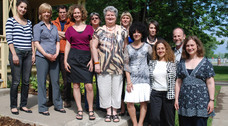The Eating Disorders Program (EDP) offers specialized clinical services for people 18 years and older who suffer from anorexia nervosa or bulimia nervosa. Children and adolescents can consult the services for children and adolescents of the Douglas Institute or the child psychiatry program of the Montreal Children's Hospital or the CHU Sainte-Justine.
The EDP is at the centre of the effort to care for people in the Quebec population. It exists as a centre of expertise, offering cutting-edge care, conducting clinical research to inform future treatment and prevention efforts, and offering training to health-care professionals at various nodes in the health-care and university systems.
A personalized approach
Eating disorders are caused by many factors—biological, psychological, and even social factors— that vary between individuals. For this reason, the EDP offers individualized treatment to resolve problems involving eating and weight control and to enhance the overall physical, psychological and social well-being of each person seeking help.
Services offered
Quebec’s largest and best-developed program for people with EDs, the EDP offers informed treatments for people with severe EDs. It supports the efforts of community services treating cases in their regions, and provides follow-up to individuals with less-severe ED forms who have not responded to non-specialized community care. Clinical services at the EDP follow current best practice guidelines and include :
An Out-Patient Clinic that offers a comprehensive range of services that can be adjusted to meet individual needs:
- Individual, family/couple, and group therapy
- Pharmacological therapy
- Nutritional therapy
A Day Program that offers highly-structured, group-based treatment. The program addresses the needs of individuals requiring intensive care, provides a more structured environment than the Out-Patient Clinic, and addresses eating problems and related psychological and behavioural issues. The program runs for eight weeks.
The only one of its kind in Quebec, the Day Hospital is designed for people with severe eating disorders who are still able to manage adequately without overnight supervision.
Day hospital treatment provides intensive therapy in a welcoming, therapeutic atmosphere. This treatment option is often suited to the needs of those leaving in-patient treatment and can sometimes replace the need for hospitalization.
The In-Patient Unit is for people with severe medical and psychological complications or those for whom out-patient treatment is insufficient to resolve eating disorder symptoms. The treatment consists of full 24-hour hospitalization and intensive, specialized treatment.
The In-Patient Unit has six beds in a secure, warm, and comforting environment.
Access to services
- You must provide a referral from a healthcare professional (you must undergo a complete physical exam).
- Within days of receiving the referral, staff conducts a preliminary evaluation by phone to determine the severity of your symptoms and assess your needs.
- You are then informed of the anticipated wait time and the available community resources you may contact for professional services (medical and psychotherapeutic) or support services (self-help or other groups) while waiting to be treated by the program.
Clinical research
Clinical research is fully integrated into practice, the concept being that ongoing research informs and optimizes patient care. Some studies at the EDP aim to elucidate the causes of EDs and to guide treatment efforts. Others concern the community, needs assessment, prevention and health-promotion.
Specialized training and Centre of expertise
The EDP provides training to clinicians, researchers, and students in undergraduate, graduate and post-graduate university programs representing diverse disciplines. The goal is to increase the number of clinicians-to-be, able to effectively treat people with EDs.
The EDP also serves as a centre of expertise on EDs, coordinating the ED focused activities of the McGill RUIS, and providing consultation and training to community professionals working throughout the Québec health network. As such, the EDP interacts with many clinical settings (and many patients) from far beyond the McGill RUIS territory. In this role, the program supports all services aimed at the needs of individuals affected by EDs in Quebec.
Interdisciplinary team
| Administrative staff
Howard Steiger, PhD, Psychologist, Program Chief Clinical staff Dominique Belisle, Psychiatrist |
|




